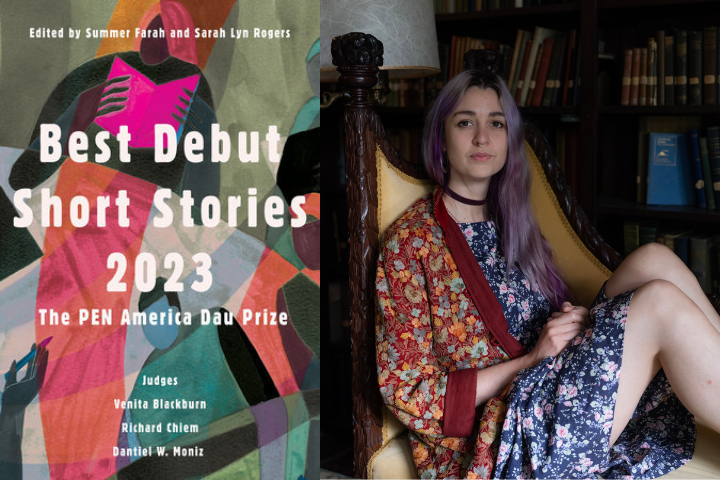Ren Arcamone | 2023 PEN/Robert J. Dau Prize Winner

In the coming weeks, we will feature Q&As with the contributors to this year’s Best Debut Short Stories anthology, published by Catapult. These stories were selected for the 2023 PEN/Robert J. Dau Short Story Prize for Emerging Writers by judges Venita Blackburn, Richard Chiem, and Dantiel W. Moniz.
Ren Arcamone is a writer from Sydney. She is a graduate of the Iowa Writers’ Workshop and an alumna of the Clarion Science Fiction and Fantasy Writers’ Workshop. She lives in Iowa City, where she is at work on a short story collection and a novel.
“Allen” was originally published in HEAT.
Here is an excerpt:
All I know is there’s a terrible wrongness sitting on my chest, mute and heavy like a stubborn cat. This happens sometimes. When I was in high school I would feel it the night before exams, as though the test had already happened and I was sitting with the uncorrectable idiocy of my mistakes, and nothing, not even doing the test, would set things right. It feels like having a spyglass that looks directly into the moment of my death, and the me that is still me is trapped in a terrible puckered face with bad-smelling dentures and I know I have frittered away my entire life. But I can’t say that. Instead I say, ‘My hair is still wet.’ Phil doesn’t catch this.
What do Archimedes, the dog, and Allen, the invisible housemate–or the two major secondary characters–represent? Why did you choose to fill these roles in this way?
Generally, I try to steer clear of characters and story elements that feel too representational or symbolic. I would hate to say, for instance, that Archimedes represents adult responsibility and Liz’s aspirations towards a stable, nurturing, parental self, because in real life, dogs don’t “mean” anything— that’s the joy of dogs. I mean, Archimedes probably does signal those things, at least a little bit, but I hope readers primarily see Archimedes as a dog (and also A Very Good Boy.)
I will say, though, that I like the chaos animals can bring to a story. I often think of that weird piece of advice from Joy Williams, who claims every short story needs “an animal within to give its blessing.” That’s an absolutely bonkers piece of advice, but I think it’s wonderful.
Allen, though, is pure invention, made up by Liz and Phil, so it makes sense to talk about what he represents. He originates as an in-joke, but then he’s also a kind of repository for their relationship issues. He’s a real douchebag, the kind of person Liz and Phil would hate to become, but he’s also got his life together. He portrays a terrifying instance of adulthood that the couple both despise and crave.
What inspired you to write this story? Where did the idea come from?
I had my own Allen while I was living in Sydney with a former partner. We called our invisible housemate Rhys. It was a real joy to hate on Rhys. We could air our grievances about trivial stuff—missed chores, a sadly shrunken sweater my partner should never have put through the dryer—in a lighthearted way. But it really only worked because we were also good at listening to each other’s serious concerns, setting Rhys aside to talk earnestly about, say, the gendered division of domestic labor or differing conflict styles. In writing “Allen”, I wondered what might happen if the invisible housemate took up even more space inside the relationship.
What do you hope readers take away from your story?
Compassion for anyone who’s a bit rubbish at being an adult.
How has the PEN/Robert J. Dau Prize affected you?
Oh, it’s affected me deeply! It’s been a huge source of affirmation and encouragement, with very practical consequences. Knowing there’s support for my work has encouraged me to finish my short story collection, and I’m looking forward to querying agents. It also connected me with other winners of the prize, which expanded my community. It prompted me to apply for residencies. I was lucky to spend a chunk of my summer at Yaddo, where I met incredible writers, including—by a strange twist of beautiful fortune— Dantiel Moniz, one of the judges. She’s an absolutely brilliant human and I’m stoked that I got to spend time with her.
What advice would you share with aspiring writers?
The main thing that changed my writing life was finding a writing community, so: do that. If you can meet people whose artistic sensibilities overlap with your own, that’s wonderful. If they’re also people you can be vulnerable with, and who can offer you both critique and affirmation, even better.






